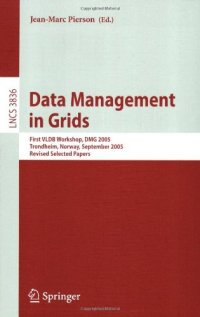
Ebook: Data Management in Grids: First VLDB Workshop, DMG 2005, Trondheim, Norway, September 2-3, 2005, Revised Selected Papers
- Tags: Database Management, Computer Communication Networks, Information Storage and Retrieval, Information Systems Applications (incl.Internet), Multimedia Information Systems, User Interfaces and Human Computer Interaction
- Series: Lecture Notes in Computer Science 3836 : Information Systems and Applications incl. Internet/Web and HCI
- Year: 2006
- Publisher: Springer-Verlag Berlin Heidelberg
- City: Berlin [u.a.]
- Edition: 1
- Language: English
- pdf
This book constitutes the thoroughly refereed post-proceedings of the First International Workshop on Data Management in Grids, DMG 2005, held in Trondheim, Norway in September 2005 in conjunction with VLDB 2005.
The 9 revised full papers presented together with 2 invited papers were carefully reviewed and selected from 24 submissions for inclusion in the book. The papers address all current research activities in relation to data management in dynamic, heterogeneous and cross-organizational environments, i.e. grids. They show unique expertise in the management of very large, widely distributed databases. Conversely, Grids offer a novel and very exciting field of research for database scientists both in terms of application domains and fundamental research.
Refereed post-proceedings of the First International Workshop on Data Management in Grids, in Trondheim, Norway. The 11 papers in this book address current research activities in relation to data management in dynamic, heterogeneous and cross-organizational environments, or grids. They show expertise in the management of very large, widely distributed databases. Conversely, Grids offer a novel and exciting field of research for database scientists in application domains and for fundamental research